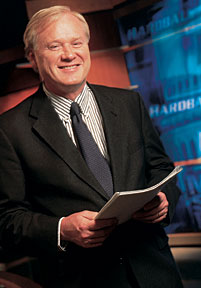
Television Journalist Chris Matthews served as a Peace Corps Volunteer in Swaziland in the 1960's.
Chris Matthews interviews former Peace Corps Deputy Director Bill Moyers on Hardball
Good evening. I‘m Chris Matthews.
Republicans on Capitol Hill are setting their sights on public broadcasting. Yesterday, a House subcommittee voted the slash federal funding for the Corporation For Public Broadcasting by 25 percent, $100 million. It is the latest round in the battle over whether public broadcasting has a liberal bias, as some Republicans allege, and whether tax dollars should underwrite the network‘s programming.
This week, I sat down with Bill Moyers, who has spent more than 50 years in journalism, mainly with PBS. He has charged conservatives with mounting a pressure campaign in the Congress and corporate boardrooms to stifle free speech on PBS. His latest collections of essays, "Moyers on America: A Journalist and His Times," is now out in paperback.
I began my interview by asking Moyers about the state of American broadcasting.
(BEGIN VIDEOTAPE)
MATTHEWS: Right now, there is a highly successful conservative cable network called FOX. Why isn‘t there a highly successful liberal network?
BILL MOYERS, PBS: I don‘t understand it. I think the people who run television think that liberals and progressives don‘t get worked up about anything. I think that they think they‘re too subtle, too complex, too erudite, let‘s say, to really defame them.
(LAUGHTER)
MOYERS: And I think they don‘t want that kind of television anymore.
In one sense, also, the people out in the country who listen to FOX News, who listen to Rush Limbaugh, they like red meat. And, you know, by nature, it is very hard for a liberal to throw red meat, simply because the issues are more complex than you can reduce down to a sound bite, although I think we have to learn to speak in that new grammar.
MATTHEWS: Well, there was a time, certainly in the ‘30s-we had Russell Crowe on earlier this week talking about the ‘30s and how bad they were-where the red meat throwers were on the left.
MOYERS: Oh, yes. No question about it. But times have changed since the Democrats in power 40 years, ran out of the whistle-or ran out of steam, became corrupt, became complacent, didn‘t build a constituency, were run by the guys in Washington, lost touch with the country.
I mean, I have-I have no question but that after 1960, the Democrats lost touch with the nerve of this country.
MATTHEWS: You write about it here.
MOYERS: Yes.
MATTHEWS: What happened? You said that they got surrounded by the beltway in Washington, that somehow the Democratic Party became an establishment and lost touch with real people.
MOYERS: Yes, they lost touch with people who were barely holding on. And I was a poor boy from East Texas. My parents never made very much money. They died poor, but happy.
But they always felt that the Democrats in Washington knew about their situation, was concerned about it. And, by the way, I never had books in the room, but there was a public library. I went to good public schools. My brother went to college on the G.I. Bill. I hitchhiked to college along a public highway and rested in a public park.
And my folks knew that somehow this-that this was the result of our collective action, of our government. And they just accepted the fact that Democrats cared about them. And then, after the ‘70s, something happened. I wish I knew what it was, except a lot of Democrats in Washington became more concerned with their cash constituents than they did with their voting constituents.
MATTHEWS: The money people.
MOYERS: The money people. They started taking their cues...
MATTHEWS: The trial lawyers.
MOYERS: Trial lawyers, courtroom-look at -- 50 Democrats voted for the bankruptcy bill, which makes it very hard for ordinary people to get a second chance, have a fresh start. That wasn‘t the trial lawyers. That was the corporate money that was coming.
Even "TIME" magazine, I mean, I don‘t have to quote Marx or Lenin or "Nation" or "The American Prospect" or "In These Times" or "Progressive." I just quote "TIME" magazine, which says we now have a government of the few at the expense of the many. I‘m not making that up. That is not Bill Moyers. That‘s the heart of the Time Warner imperium.
"TIME" magazine says we now have a government of the few at the expense of the many.
MATTHEWS: Well, let me quiz you on this. I think you make the big point, not just-well, let me ask you the questions. You know where the Republican stands. They‘re for the war in Iraq.
MOYERS: Yes.
MATTHEWS: Where is the Democratic Party on that issue?
MOYERS: A lot of Democrats voted for the war in Iraq.
MATTHEWS: Yes. So they don‘t have a position as a party.
MOYERS: Yes.
MATTHEWS: You know the Republicans want to take Social Security and bring in personal accounts. What‘s the Democratic Party‘s position on Social Security?
(CROSSTALK)
MATTHEWS: Do they have a clear position on anything?
MOYERS: No.
MATTHEWS: Energy? The war? Social Security? I have a-well, you tell me. Do they have a position?
MOYERS: By the way, I‘m not an advocate of...
(CROSSTALK)
MOYERS: I‘m not a spokesman for the Democratic Party.
(CROSSTALK)
MATTHEWS: I‘m talking about the clarity in the public debate today.
MOYERS: Here‘s what I think happened.
The conservatives on the night that Lyndon Johnson-and I was in the White House-crushed Barry Goldwater, beat him by the biggest plurality any candidate had ever received, the Republicans decided, the conservatives decided that was the end of the campaign, but it was the beginning of a movement. And they set out and took over the Republican Party and made it their instrument.
The ideology of the conservatives is now the soul of the Republican Party. And they‘ve reduced it down to some very effective sound bites, limited government, no new taxes, personal responsibility, and faith in God. Nobody set out to take over the Democratic Party. It was taken over, as you say, by the trial lawyers, by the cash constituents in Washington.
And there is no ideology, no soul in the Democratic Party now because it wasn‘t taken over by people who really believe and really care about what is happening to average people.
MATTHEWS: Well, could it be, Bill Moyers, that the New Deal succeeded? A lot of people like my dad went to school on the G.I. Bill. You got the G.I. Bill, right? I got to school on National Defense Education Act loans, right, to a large extent.
I had a full fellowship to graduate school with a National Defense Education Act fellowship. I was in the Peace Corps. We benefited. We grew, a lot of American, because of the programs that were started by Democrats. Could it be that the middle class today is middle class largely because of the G.I. Bill, because of Social Security, because of the student loan programs, and therefore they don‘t really think like Democrats anymore?
MOYERS: I think that‘s true.
We came out of the greatest postwar era, the greatest era of posterity in the period after World War II. I was-my boat was lifted by that period, as were yours and so many other...
(CROSSTALK)
MATTHEWS: Mine was definitely lifted.
MOYERS: ... of the boats. And we did create-particularly by the way-particularly among the poor blacks in this country, government programs were essentially the main instrument for their achieving middle-class status, beginning to think of themselves as middle class.
(CROSSTALK)
MATTHEWS: The portion that have done that.
MOYERS: Yes. It‘s not most of them. It‘s-but-but-but then for those people who had achieved middle class, they had the means now, the luxury now. I don‘t mean luxury in living, but they had the time to think about other things than making a living and making ends meet. That is changing.
In fact, what deeply troubles me and why the Democratic Party is really fumbling this ball is that, if you travel the country as I do, and you do often, if you listen to ordinary working people out there, you know that they no longer feel the governing elites understand them or speak for them. Millions of them can hardly pay their bills. And the Democrats are forgetting that those people who were in the middle class are slipping and the working-class people in this country, or the working people in this country, can hardly make ends meet.
MATTHEWS: OK.
I watch Sunday television. I never see a really good articulate labor leader on television. What happened to the George Meanys and the Walter Reuthers we grew up with? Where are the strong, articulate voices of the working person, the working family out there? That voice that you‘re talking about, who worries about trade policy, who worries about tax policy, who worries about being trained for the job, where are those voices on Sunday?
MOYERS: Well, where are they on public broadcasting? I mean, I made a speech recently in which I said, you won‘t hear the losers in the class war, even on public broadcasting, because we too represent the consensus of the corporate underwriters, the establish.
MATTHEWS: Yes. No, but they‘re not-they don‘t have speakers. I‘m telling you, I can‘t think right now of a labor leader that could match wits with a Dick Cheney on television?
(CROSSTALK)
MATTHEWS: They don‘t want to get out there and debate, like they used to. People on the center or the political left, or center-left, you tell me who the great spokesmen are for labor right now.
(CROSSTALK)
MATTHEWS: Who are the great spokesmen against this administration‘s trade policies or this administration‘s tax policies? Who are they?
MOYERS: There are some wonderful people at the grassroots level, activists taking place, people like Beth Shulman, who writes about working people. They are terrific. But they never get on television. We put celebrities on. We put elites on. We put establish people on. But we never give working people a chance, by the way, to speak for themselves.
(CROSSTALK)
MATTHEWS: Well, they should get elected to Congress. Then we will put them on.
MOYERS: Do you know you have a better chance of being elected to the legislature in Russia if you‘re a member of the working class than you do being elected to Congress in this country?
Look what happened in New Jersey this week. Two multimillionaires are going to be running against each other in-for the Democratic gubernatorial election in November. I mean, you can‘t do it as a working-class today person in this country. It is not just politics. It is a lot of other things. When I went to Washington, Chris, in 1960, the difference between rich and poor was 20-fold. It is 75-fold today. Money has drowned out the conversation of democracy.
MATTHEWS: And what are we going to do about it?
MOYERS: Well, we‘re going to have to start listening to those people I‘ve been listening to out there. You cannot travel this country, I repeat, without being impressed with the fact that some people are mad as hell and they are not going to take it anymore.
They are organizing in L.A. Look at the new mayor of Los Angeles. I mean, he is not a leftist in the sense you think of a leftist. He has got some conservative values. He‘s trying to move beyond left and right. This is going to come not from Washington. It is too late. Washington is gone. The movement that speaks for regular people is coming from the grassroots, from organizers, from activists and people like that.
MATTHEWS: We‘ll come right back and talk to Bill Moyers. We want to talk about public television. Is it left? Is it too left? Is it somewhere where it should not be or not? I also want to talk about these cultural issues, because I think the conservatives in this country, when they hear people talking like you talk, they say, well, let‘s change the subject to something more palatable, like abortion rights and gay marriage. And they win on those issues.
We‘ll be right back with Bill Moyers.
(END VIDEOTAPE)
(COMMERCIAL BREAK)
MATTHEWS: Coming up, Bill Moyers on why the conservatives are winning the battle of the airwaves.
(COMMERCIAL BREAK)
(NEWS BREAK)
MATTHEWS: Welcome back to HARDBALL‘s eighth anniversary.
A House subcommittee Thursday voted to slash federal funding for public broadcasting by 25 percent, down to $300 million. Bill Moyers has been at the forefront of the fight over whether public broadcasting has a liberal bias, as some Republicans charge.
Here now, more of my interview with Bill Moyers.
(BEGIN VIDEOTAPE)
MATTHEWS: Bill Moyers, public television, you personify it, to a large extent. You are the face of big picture, long-headed thinking, long white papers on important subjects. Are you too liberal for public television?
MOYERS: Well, the chairman of Corporation For Public Broadcasting thinks I am.
And here‘s the irony. He was watching television one night, according to what he told "The Washington Post." I‘m not making this up either. "The Washington Post" two weeks ago says he was watching public television, watching my broadcast. I was doing a documentary about what is happening to the working people of a town in Pennsylvania called Tamaqua about-they‘ve been devastated, factories moving out, jobs going to-to-to China, to Honduras, Central America.
As when-as he was watching, he told "The Washington Post," it was more than I could take, liberal advocacy journalism. He was mistaking liberalism for journalism. I was reporting. These were people talking for themselves, the kind of people in our last segment we were discussing. He was-he couldn‘t take it. You know why he couldn‘t take it?
Because the one thing ideologues don‘t want-and this is my complaint about television today-the one thing they don‘t want is reporting from the ground up that defies the party line. And the chairman of the CPB, an ally of Karl Rove, a conservative...
MATTHEWS: Ken Tomlinson.
MOYERS: Ken Tomlinson.
I‘ve never met him. I‘ve tried to meet him. He didn‘t want to get together and-and-and-last year, when I asked him. He couldn‘t take the fact that this reporting from the ground about these people you and I know so well was at odds with the official view of reality in Washington, which is, everybody is doing well.
MATTHEWS: Well, Ken used to edit and publish some of my stuff at "Reader‘s Digest." So I am not going to join the attack on Ken.
(CROSSTALK)
MOYERS: Oh, I‘m not attacking him.
(CROSSTALK)
MATTHEWS: But let me ask you about that kind of reporting.
MOYERS: Have him sometime.
(CROSSTALK)
MATTHEWS: Edward R. Murrow reporting, "Harvest of Shame," "Point of Order," the great broadcasts with CBS in the old days, would he consider those to be too liberal?
MOYERS: You would to have ask him.
(CROSSTALK)
MOYERS: And I‘ll be glad-I‘ll be glad to come on your show with Kenneth Tomlinson any time you can get...
(CROSSTALK)
MATTHEWS: Well, we‘ll see if we can put it together.
(CROSSTALK)
MOYERS: But here‘s the thing. You said long white papers, etcetera.
But most of my-much of my reporting in the 35 years I‘ve been on public broadcasting has been about real people. I‘ve been out there listening to America. That was the title of my first book. The show that got him so upset was about working-class people.
I spent the whole decade making four films about two families in Milwaukee who were hardly making it in the new global economy. That‘s where my reporting has come from. It is not my interview with Joseph Campbell that upset the right.
MATTHEWS: Right.
MOYERS: It is reporting about people who are not-who are barely holding on.
MATTHEWS: Well, the irony, I guess, we would say, worse than the irony, is, if you don‘t fly across America from coast to coast, if you drive across it, you go through places like Michigan City in Indiana or you go to Spencerville, Ohio.
Most of America, all the way across the North, and the center part of the country, is filled with small town with not much happening anymore, except the blockbuster movie theater and a small restaurant.
MOYERS: Lots of pain.
MATTHEWS: And Sioux out in Iowa. We were out covering the campaign with people like John Edwards, following them around. So much of the country looks like that. It looks like it has been hit by a tornado in terms of the de-industrialization of America.
(CROSSTALK)
MOYERS: On the eve of-on the weekend before George W. Bush‘s second inauguration, "The Economist," "The Economist," the pro-business, pro-capitalist publication from-from-that looks at us with keen eyes.
"The Economist" concluded-and I‘m not making this up-quote-
"The United States is on its way to becoming a European-style class-based society."
"The Wall Street Journal" last week said that if you were a born-a child born in the last four decades-last few decades on-in Europe or in Canada has a better chance of getting out of poverty and experiencing prosperity than the child in this country. And the American Political Science Association, one of the best organizations in this country, concluded that inequality is rising so fast in this country that it threatens the quality of democracy.
Those are not left-wing, Marxist publications. Those are mainstream business publications, deeply concerned about what‘s happening between the coasts of this country, where people are truly in misery.
MATTHEWS: How do people who are in that center part of the country, on the center-left or left part of the country, make their case on economic issues, where I think there is a debate that could be won?
MOYERS: Yes.
MATTHEWS: When the Republicans are so effective, and the conservatives, the church people as well, in making the issue abortion rights, where a lot of people are concerned there are too many abortions, the gay marriage issue, which threatens a lot of people with a total challenge to their cultural way of life?
And fair enough. But the Republicans, this president particularly, last election, something like 13 states had balloting on the issue of gay marriage the very day they were voting for president. Everybody believes that helped the president and hurt the Democrats.
MOYERS: I‘m a church person. I grew up in a deeply Protestant culture and a deeply Baptist congregation in Texas. I‘m an evangelical. I have moral concerns, too.
And I think the answer is for those who disagree with it-and the conservatives have-I agree that moral issues are important to conservatives. But they‘re equally important to liberals, but we don‘t say either/or. We should say and/and, that you should be concerned about moral issues and concerned about the quality of life for millions of people. By one estimate, 80 million people in this country are having a hard time paying their bills. And you mentioned the success of the New Deal.
MATTHEWS: But I don‘t know of any Democratic liberal person or commentator who is effective at addressing both the cultural questions with some traditional values and the concerns about the economy, which really can be very unfair to certain people. Who is out there doing that?
MOYERS: Well, not now, but there was Cuomo and the governor of Iowa, the lieutenant governor.
MATTHEWS: There was William Jennings Bryan, too, but I‘m talking about recently.
(LAUGHTER)
(CROSSTALK)
MOYERS: ... what happened to him.
MATTHEWS: I mean, Cuomo has been out of business for a while. I mean, there aren‘t many spokespeople out there from this point of view which you‘ve addressed.
MOYERS: Somebody has got to get up and say, yes, the New Deal did succeed, but the 25 years of the Republican-the 40 years since, when the conservatives took over, they set out to undue the New Deal.
You read Bill Simon, who was Richard Nixon‘s secretary of the treasury, wrote a polemic called "A Time For the Truth." And it was, we have got to take it back, boys. We‘ve lost it since the Depression and the New Deal. And the last 40 years, they‘ve-what was behind George W. Bush‘s failed effort to phase out Social Security? They know if they can crack that stone, they can undo the social contract that enables some people..
MATTHEWS: Well, they want a personal part of the-they want personal accounts as part of Social Security.
MOYERS: Well, I‘m not against personal accounts, but you have got to build them on the floor. You have got to-everybody should have a floor. And then, if you have got the means, you build above that.
But nobody is out saying-nobody is speaking-economics is a moral issue, Chris. You know that.
MATTHEWS: You are all piss and vinegar. You are amazing.
(LAUGHTER)
MATTHEWS: You are amazing. You are something else.
(CROSSTALK)
MOYERS: ... issue.
MATTHEWS: You should run for parliament.
MOYERS: From parliament. I don‘t have the accent.
MATTHEWS: Bill Moyers. Bill Moyers, "Moyers on America: A Journalist and His Times," thanks for joining us on HARDBALL.
MOYERS: Thank you.
MATTHEWS: Good luck with the book.
MOYERS: Thank you.












